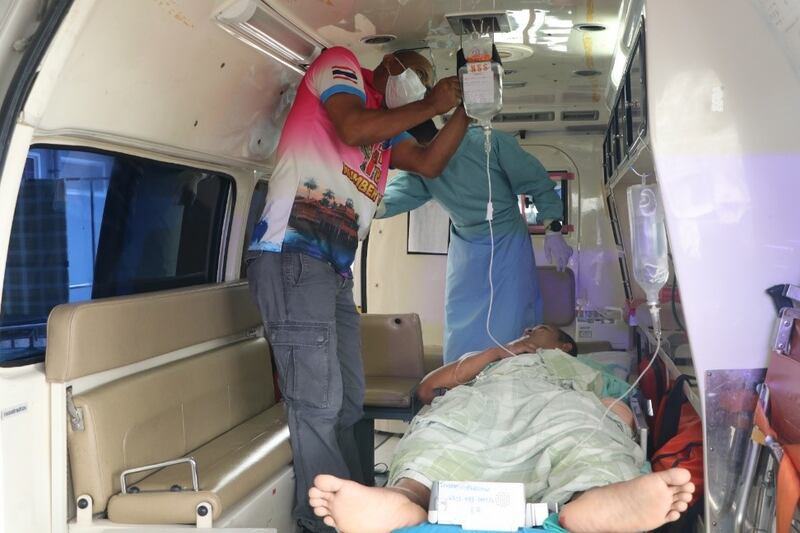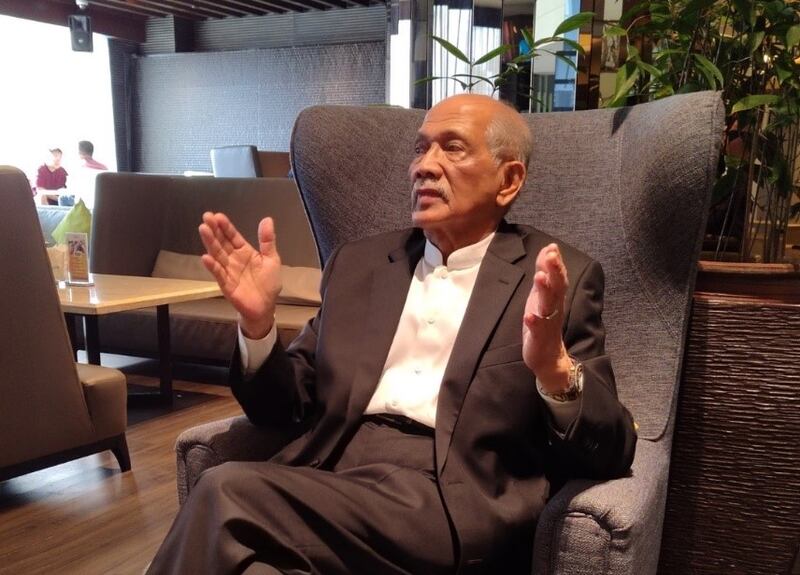Negotiators for Thailand’s government and the main southern rebel group discussed a potential three month-plus pause in violence during the latest round of peace talks that wrapped up in Malaysia on Tuesday, officials said.
But hours before the talks ended and both sides dispersed, a roadside bomb injured two village defense volunteers in Pattani, one of the provinces in Thailand’s troubled Deep South.
The Malaysia-brokered talks between the Thai government and the Barisan Revolusi Nasional (BRN) insurgents – the third set of in-person meetings this year – unfolded over two days at a Kuala Lumpur-area hotel.
On Tuesday morning, however, suspected insurgents targeted local defense volunteers in the attack in Pattani’s Mai Kaen district as they escorted civilians to school, police said.
“Six defense volunteers were riding on three motorcycles to protect teachers and students in the area … when the attackers triggered the bomb rigged to a cooking gas cylinder, injuring two of them,” said Maj. Gen. Narin Busaman, chief of police for the province.
The injuries to the two volunteers were not life threatening, police said. As of late Tuesday, no one had claimed responsibility for the attack.
Meanwhile outside Malaysia’s capital, officials who attended the peace talks said the two sides assessed an April-May pause in violence and discussed similar proposals for the future without agreeing on anything substantial.
The Thai government proposed a fresh ceasefire – from Aug. 15 to Nov. 30 – and that would cover much of the Buddhist Lent in Thailand, but the insurgent side did not immediately agree to it, officials said.
After their previous round of talks, both sides successfully observed a 40-day truce around Ramadan, although another rebel group, the Patani United Liberation Front (PULO) carried out twin roadside bombings that killed a villager and injured three police officers in Pattani.
At the time, PULO’s leader claimed it was responsible for the attack, saying his group carried out the bombings because it had been shut out of the peace talks. PULO was not invited to the latest round of talks.
At this week's peace talks, the two sides "jointly assessed the implementation of the peaceful Ramadan initiative, from April 3 to May 14, which both took as a lesson for future improvement," Gen. Wanlop Rugsanaoh, the head of the Thai delegation, told reporters on Tuesday afternoon during a press conference from the Thai Embassy in Kuala Lumpur.
“We both agreed the Ramadan Peace Initiative is a key step forward to an intensified reduction of violence in the Deep South.”
This time around, Wanlop said, Thailand had proposed “to reduce violence” for 108 days to cover the Buddhist Lent festival, which runs from July 14 to Oct. 10, with joint teams, including community organizations and BRN representatives, to monitor the situation.

Abdul Rahim Noor, the Malaysian facilitator of the talks, also spoke about the Thai government’s proposal “for another peace initiative, similar to Ramadan.”
“BRN, however, did not agree with some of the terms put on the table during the discussion. So, they have yet to reach an agreement on this issue,” he told BenarNews.
During the talks, both parties proposed ways to reduce violence in southern Thailand, Rahim Noor said, adding that Malaysia was looking at the proposals.
Anas Abdulrahman, the BRN's lead negotiator who is also known as Hipni Mareh, did not divulge any information, saying his delegation would hold a news conference on Wednesday.
On Monday, Anas confirmed to BenarNews that a reduction in violence was among topics being discussed in the newest round of talks, but he did not comment about a potential truce during the Buddhist Lent.
A conflict analyst said he did not expect to see "a dramatic breakthrough" during the near term in peace negotiations between Thailand and the BRN.
“The parties still have a long road to travel before they come to grips with the compromises necessary for a political settlement,” Matt Wheeler, a senior southeast Asia analyst International Crisis Group, a Brussels-based conflict-monitoring and prevention group, told BenarNews.
“More immediately, I expect there will be further efforts to reduce the level of violence and discussions about how public consultation on political solutions should be carried out,” he said.
‘A policy of inclusivity’
BRN and other separatist groups have been waging a decades-long armed separatist insurgency against Buddhist-majority Thailand in the Deep South, a predominantly Muslim and Malay-speaking region on the border with Malaysia.
Since the insurgency reignited in January 2004, more than 7,000 people have been killed and 13,500 others injured in violence across the region, according to Deep South Watch, a local think-tank.
After it carried out the roadside bombing in Pattani in mid-April, PULO, in late July, asked that it be allowed to join the peace talks as well.
On Tuesday, Wanlop, the chief Thai negotiator, said that PULO was not mentioned during this week’s meetings with the BRN.
“We have some concerns about PULO’s operations on the ground, [though] we have a policy of inclusivity,” said Wanlop, adding that PULO could have worked “to be included in the peace talks” or “join other insurgent groups to talk with us.”
“If no other groups would join, PULO could join discussions at a local level,” he said.

Rahim Noor, a former police chief, said Malaysia had no power to decide who would be invited to the negotiating table.
“We will facilitate whichever group the Thai government decides to talk to. Few groups showed interest, but they have to approach the Thai government to express their intention,” he told BenarNews.
PULO chief Kasturi Mahkota did not immediately respond to BenarNews requests for comment about not being invited to the talks. Earlier, he had said that the group had contacted a government negotiator through an online channel to be included.
Wheeler said PULO “is not likely to play spoiler to a process it is seeking to join.”
“Its efforts to demonstrate its capabilities will likely be calculated with this end in mind,” he said.
Last week, a senior army general who is a member of the Thai delegation to the peace talks suggested that PULO did not represent a big threat.
“Regarding PULO, I think it does not have a real practical force. They are just a band of people who got together and mounted attacks. In layman’s terms: they are merely hired hitmen,” Lt. Gen. Thira Daehwa, the secretary for the Thai panel, told BenarNews.
“We arrested eight of them and killed two in Raman district, and they are almost gone,” he said. “Our peace talks policy is that we talk to any groups willing to talk, on an unofficial basis, at any place ... If they [PULO] want to talk, they can join the BRN or come as a stand-alone group.”
Muzliza Mustafa and Nisha David in Kuala Lumpur, Nontarat Phaicharoen and Subel Rai Bhandari in Bangkok, and Mariyam Ahmad in Pattani, Thailand, contributed to this report.
